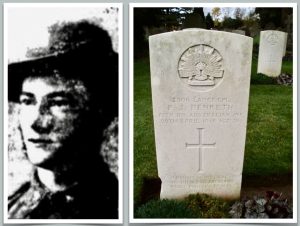17th Battalion, Australian Infantry

Percy James Penketh was born at Forest Lodge, Sydney in 1894 and was the son of James William and Eva Penketh of Esther Road, Balmoral Beach, Mosman, New South Wales (NSW), was one of three brothers to serve in the Australian Imperial Force (AIF) in the Great War: only one survived.
Percy was a labourer, who enlisted at the Sydney suburb of Liverpool, NSW. He enlisted on 4 August 1915 and was posted to the 5th Re-enforcement, 17th Battalion, Australian Infantry.
He embarked from Australia on 5 October 1915 bound, initially for Egypt. On 17 March 1916 he sailed from Alexandria bound for Marseilles, arriving on 23 March 1916 and travelled by rail north through France to join the British Expeditionary Force (BEF) on the Western Front.
On 25 August 1916 he was wounded in the left arm by shrapnel and after treatment at 3rd Canadian General Hospital he was evacuated to England on the Hospital Ship Jan Braydel and was admitted to the 2nd Northern Hospital, Leeds on 29 August 1916.
He stayed there until 18 September before transferring to Harefield Hospital and then on discharge to No 1 Command Depot, Perham Down, Wiltshire on 21 September. He joined 5th Training Battalion there before going on furlough on 23 September 1916.
The 11 November of that year saw him on board a troopship to France from Folkestone and arrived at Etaples on 13 November. On 24 November he rejoined the 17th Battalion in the field.
Between 8 and 9 December Percy went absent without leave on two occasions which saw him receive ten days Field Punishment No 2 and the loss of two days pay, however, this lapse of discipline did not appear to inhibit his promotion to Lance Corporal on 3 May 1917.
He then went absent without leave again on 5 and 6 July 1917 and had to revert to the rank of Private and lost two day’s pay.
Yet again he was promoted to Lance Corporal, on 25 September 1917!
The period 9 to 29 April 1918 saw that part of the German Spring Offensive known as the Battle of the Lys and on 17 April Lance Corporal Penketh suffered from the effects of a gas shell.
He was taken to 20th Casualty Clearing Station before being transferred to 9th General Hospital at Rouen on 18 April.
He was evacuated to England on the Hospital Ship Grantully Castle on 21 April and was taken to the Priory Voluntary Aid Detachment Hospital, London Road, Cheltenham on 22 April. He was reported as ‘dangerously ill’. This hospital was staffed by No.30 Gloucestershire Voluntary Aid Detachment.
He failed to recover from the effects of the gas and died of cardiac failure and double pneumonia at 12.30am on 29 April 1918, aged 26.
He was buried in Cheltenham Cemetery at 3pm on 2 May 1918, having been given a full military funeral, with a bugler and firing party supplied by the Gloucestershire Volunteer Regiment and representatives of the hospital attended.
Later a standard CWGC headstone was erected on his grave.
Percy Penketh’s brother, 3444 Private Milton Dudley Penketh, 1st Battalion, Australian Infantry, was reported missing in action on 5 November 1916, age 22.
It was believed that he was buried about 450 yards north north-west of Guedecourt, in the Somme sector but has remains were never found.
He is commemorated on the Villers Bretonneux Memorial to the Missing.
Oddly, he was stated to have been in attendance at his brother’s funeral but it was likely that this was a case of mistaken identity and the third brother 3112 Private Clyde Vivian Penketh, serving with Australian HQ in London, was in fact present. He survived the war, despite being wounded.
